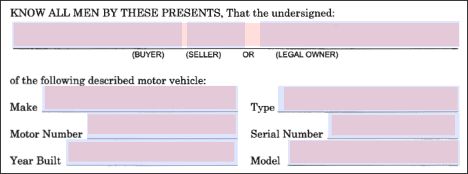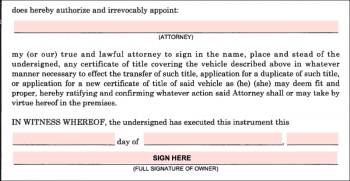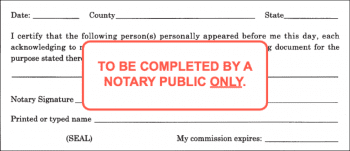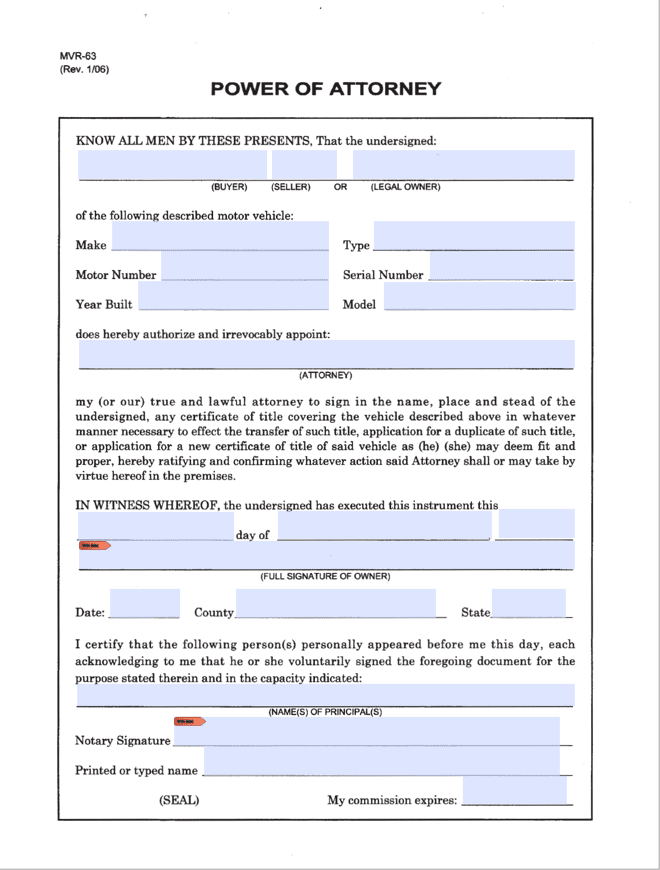North Carolina Vehicle Power of Attorney (MVR-63)
A North Carolina motor vehicle power of attorney (MVR-63) is completed by a vehicle owner to give a person (the attorney) decision-making power. With permission, the attorney can register and title the owner’s vehicle, apply for a duplicate title, record a lien, or handle any other critical matter relating to the automobile.
| Signing requirements: Vehicle owner and notary public. |
What is a North Carolina Motor Vehicle POA?
A North Carolina motor vehicle power of attorney provides evidence that the Division of Motor Vehicles (DMV) or a third party needs to verify the authority of an assigned representative. It essentially says that the owner has allowed another person to take care of their duties without their attendance.
Before signing the document, the owner must inform the attorney of the requested duties. If the attorney makes decisions that do not align with the owner’s wishes, they become liable. Therefore, both parties should ensure that they understand the task at hand and the process required to complete it.
How to Buy or Sell a Principal’s Car
A motor vehicle power of attorney allows an assigned person to buy or sell a vehicle for the owner. The document must include the representative’s personal information so that others can identify them.
To buy or sell a principal’s car, the agent must closely follow the orders provided by the owner in the form. They must attend any required appointments, or have discussions with the requested individuals. Furthermore, they must keep the owner updated (unless they do not wish to be contacted) throughout the process.
Staying organized helps both parties to lay out the timeline of the transaction(s) and reimburse one another as needed. For instance, the representative should keep each receipt that pertains to the sale. That way, if the attorney has to use their own money, or ask for additional money from the owner, there is no confusion about the amount owed.
It is important that the representative only uses the allotted amount of money. The only exception is if they receive approval from the owner to spend more. Similarly, if they do not use the full amount, they must give the owner their money back.
How to Write
Download: PDF
Step 1 – Owner Name and Car Description
On the first line, specify the name of the person granting authority (who is also referred as buyer, seller, or legal owner). Then provide the car details:
- Make (e.g., Chevrolet)
- Type (e.g., sedan)
- Motor Number
- Serial number (a.k.a, Vehicle Identification Number, or VIN)
- Year (e.g., 2009)
- Model (e.g., Malibu)

Step 2 – Agent Name and Owner Signature
Write the agent’s name (attorney-in-fact) on the top line. The owner executes this document by writing the current date (e.g., 7th day of September 2025), signing, and writing his/her county and state.

Step 3 – Notarization
North Carolina state law requires this form to be notarized. Notarization can be completed online at eSign.com or in-person through government, public, or private entities.

